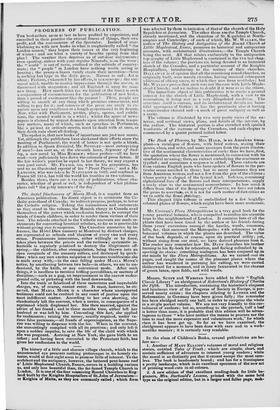.PROGRESS OF PUBLICATION.
THE booksellers seem at last to have profited by experience, and consulted in their practice the eternal fitness of things, their own profit, and the convenience of the Spectator. Instead of over- whelming us with new books in what is emphatically called " the London Season," they began their issues at the very beginning of winter : and see what a variety of benefits spring from that plan ! The weather then deprives us of out-door enjoyments; even sporting, unless with your regular Nitnrods, is on the wane ; the " world " is out of town, confined to the solitude of country- seats ; the " people" in London have nothing worth seeing or hearing ; the penny-a-liners vainly strain their invention—there is nothing but type in the daily press. Nature is sad ; Art is silent ; Fashion, exhausted by her effr.rts, is in a syncope ; the uni- versal mind, unable to receive impressions through the Senses, is threatened with stagnation ; and all England is agog for some new thing. How much fitter (as we hinted at the time) is such a conjunction of circumstances for the publication of new books, than a period of excitement like the present ? Then, people are willing to snatch at any thing which promises amusement, and willing to pay for it; and caterers of the press are ready to ex- patiate upon any excellence at a length proportioned to its deserts. Now, what with Parliament, parties, plays, operas, and exhibi- tions, the mental world is in a whirl ; whilst the space of news- papers is claimed by urgent demands upon attention from tempo- rary matters, many of which, such as speeches in Parliament, like a patient in articulo moths, must be dealt with at once, or their death cuts short all dealing.
The upshot is, that new books of importance are just now scarce. Yet, although the publishers have slackened their efforts since the meeting of Parliament, the world of letters is not quite a blank. In addition to Spain 1? ensued, Mr. BENTLEY—most enterprising of men !—has sent us, at the eleventh hour, Seymour of Sad- ley, a new novel by Miss BURDEN; whose preface—all we have read—very judiciously lays down the rationale of prose fiction. If the fair writer's practice be equal to her theory, we may expect a very good novel. Mr. FRASER, too, wise in his generation, has sent us an illustrated reprint of his " Prout Papers:- and a Mr. LANGTosr, who was taken by NAPOLEON in 1809, and confined in France till 1814, has told the world his troubles in two volumes.
Besides these, there are a var:ety of publications, whose cha- racter, whether of good or evil, is independent of what philoso- phers call •• the petty interests cf the day."


























 Previous page
Previous page